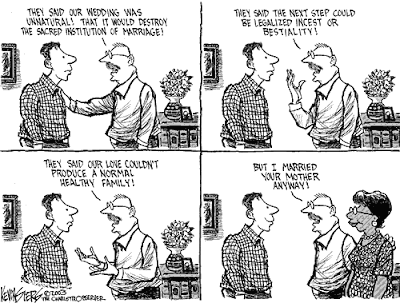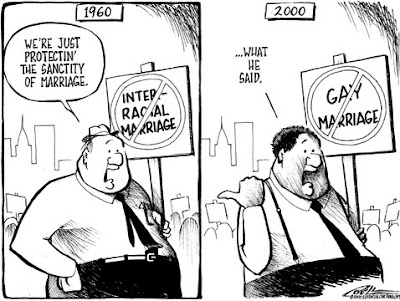
One of the main arguments for Proposition 8 is that the majority of the citizens should decide who gets to marry, and how marriage should be defined.
In 2000 61% of California voters passed a proposition that defined marriage as being between a man and a woman. This was recently overturned by the California Supreme Court as unconstitutional because the California state constitution proclaims equal rights to all citizens.
Many Californians are upset that judges could overturn a proposal that was passed by a majority of the citizens in California. This situation brings up a question of how our democracy works and how the constitutional rights of groups and individuals are protected. Who has the power to protect our rights, the majority of citizens or a few liberal or conservative judges?
When it comes to the protection of our rights, is a vote of the majority the best way? In a pure democracy the majority would rule on every issue. This is not how our government is set up to function though, and there are good reasons for that. Our constitution is designed to protect the rights of all individuals not just the majority. Many of the groundbreaking movements in our history such as the abolition of slavery, the civil rights movement, and women's suffrage would not have happened when they did if it were left up to individual states to institute these changes through a majority vote of their citizens.
Our constitution is designed to give equal rights to everyone, including the smallest minorities. We depend on judges to interpret the constitution and to objectively protect the rights of all citizens, not just the majority's rights.

This brings up another question; is marriage considered a right?
In 1967 the US Supreme Court Case Loving v. Virginia overturned laws forbidding interracial marriage. The court wrote:
"Marriage is one of the "basic civil rights of man," fundamental to our very existence and survival.... To deny this fundamental freedom on so unsupportable a basis as the racial classifications embodied in these statutes, classifications so directly subversive of the principle of equality at the heart of the Fourteenth Amendment, is surely to deprive all the State's citizens of liberty without due process of law. The Fourteenth Amendment requires that the freedom of choice to marry not be restricted by invidious racial discrimination. Under our Constitution, the freedom to marry, or not marry, a person of another race resides with the individual and cannot be infringed by the State."
The US Supreme Court has not applied this ruling to homosexual marriages at this time, however, the California State Supreme Court's ruling established that any law discriminating on the basis of sexual orientation is constitutionally suspect.
Many of the same arguments that are being used to fight against gay marriage were used to fight against interracial marriage.


Part I discussed the nature of homosexuality. I believe that the relatively recent discussion and understanding of sexual orientation in our society has led to changes in the way that we think about this issue. Homosexuality is beginning to be protected from discrimination in legal cases the same way that any other inherent trait is protected. I believe that in the not-too-distant future the law will ban discrimination based on sexual orientation the same way that it protects disabled people or people of color.
Part III Preview:
How will school children be affected by equality for homosexuals? Will traditional marriage be harmed by gay marriage?
I'm glad you so eloquently summed up the constitutional side of this issue. Also, I'm glad there were cartoons! :)
ReplyDeletePart III will be interesting. There are several students at my small school who have parents who are gays/lesbians - and let me tell you, they turn out just as any kid would, only the ones I know seem to have a finer sense of empathy towards minority groups. Coincidence?
Thanks for posting! Not related but what are your thoughts on Washington passing physician assisted suicide?
ReplyDeleteI honestly haven't thought too much about it yet. It's an interesting dilemma for a social worker - does self-determination trump physical well-being? I think the way it has been sanctioned only for people that have a terminal illness pretty much rules out physical well-being either way. Maybe after I get all my thoughts about gay marriage out I can consider that issue next. What do you think about it?
ReplyDeleteI think much the same about most things, that if there is agency involved, it belongs to the individual- be it whatever consequences may follow. About the first topic: Well, I was thinking about this the other day when I read on CNN about protesters marching towards the LDS temple in West L.A. I am not afraid to share my opinion that we cannot and should not force people to do what we think or believe is right. Whether it is right or not, a choice or not, a sin or not, such is not for me to judge. I make myself available for assistance, education, guidance, coping skills, or sometimes even just hope... but it is not for me to judge. I have made a personal choice to try harder to find the good in people and allow others to do the same. I worry that some of my church members have taken upon themselves the role of judge. I read the LDS church donated millions, but I cannot verify that right now. Did we also donate millions to campaign against the state of Washington and against physician assisted suicide because we believe suicide ranks as murder? And by the way, murder is a greater sin than any sexual sin so what happened here, did the church separate this issue as one of agency and the other not so much? Tithing? Oh goodness. I hope my tithing here in Germany (zehnte) really does go to the missionaries, building churches and temples... Will we spend this much every time this issue comes up? Melissa Etheridge said no more taxes because she is not a full citizen with the same rights as everyone else. If I don't agree with something in the church I am not going to withhold tithing, I am going to continue to live the gospel the way I understand Christ would want me to. And that is part of what I think will happen here. This issue is here to stay. People will continue to live the way they believe they should, or are entitled to- and I will continue to mull it over with you and then go about the business of smooching my smokin' hot wife. Speaking of which, I can't wait to set you up with some of these foreign women. Hurry it up already. At this rate, Audrey and James may even beat you out here.
ReplyDeletePaul, very interesting stuff here. I read a response to a gay marriage article the other day that seemed to be a very logical, yet simple solution to this issue. This person was arguing that the legal system should ONLY create civil unions between people, gay or straight (Equal rights for both). Then beyond that, people could decide to get married through their church, since marriage seems to be such a charged religious issue. So everyone would be guaranteed legal rights and marriage could be dealt with as a separate religious issue. Everyone is Happy. -Pete
ReplyDelete